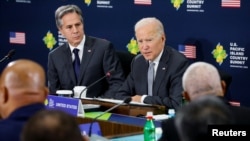The United States hosted the first-ever U.S.-Pacific Islands Country Summit to build on the commitment to the people of the Pacific. The Pacific Islands and the United States have long standing trade and diplomatic relationships. In addition to protecting the security of the region, the United States is also committed to combating the dangers of climate change. At the summit, President Joe Biden stressed the importance of strengthening these partnerships.
"We’re seeing the consequences of climate change around the world very vividly, including in the United States right now. And — and I know your nations feel it acutely."
However, preparing for climate change is a complex challenge noted Secretary of State Blinken.
"Building resilience is about more than equipping communities to adapt to the effects of the climate crisis, which for many of you is an existential threat; it’s also about preparing communities to weather a wide range of interrelated shocks that we know have caused cascading effects."
To that end, President Biden has announced $810 million in expanded programs to improve the lives of Pacific Islanders. These investments include preparing for climate impacts on health and food security and building early warning capacity to predict, prepare for, and respond to climate hazards.
Secretary Blinken also discussed plans to strengthen marine livelihoods by supporting fisheries, aquaculture, and tourism as part of the Resilient Blue Economies program. The Blue Economy refers to “the sustainable use of ocean resources for economic growth, improved livelihoods, and jobs while preserving the health of ocean ecosystems.”
The United States also joined Australia, Japan, New Zealand, and the United Kingdom in the first Partners in the Blue Pacific Ministerial. Together these countries met with members of the Pacific Islands Forum (PIF) to discuss how to efficiently develop and bolster the Pacific Island governments and economies in line with the PIF’s 2050 Strategy for the Blue Pacific Continent.
The United States is committed to deepening the relationship with the Pacific Island countries and helping them prepare for future climate hazards that threaten the region.
Building a More Resilient Pacific Islands Region

The United States hosted the first-ever U.S.-Pacific Islands Country Summit to build on the commitment to the people of the Pacific.





